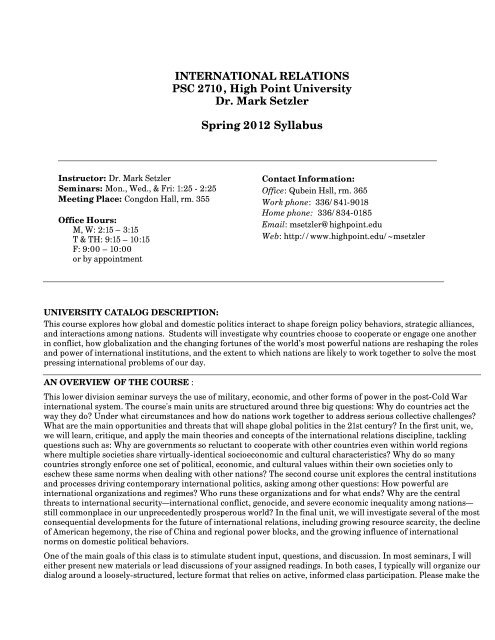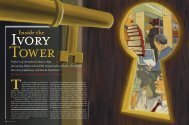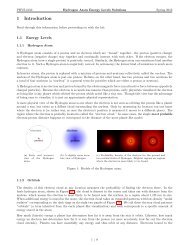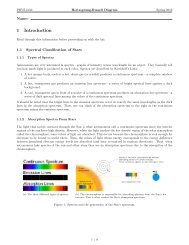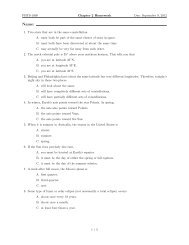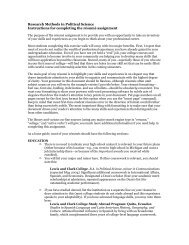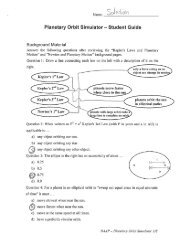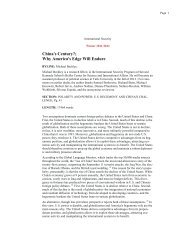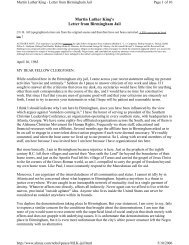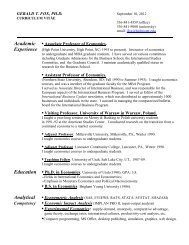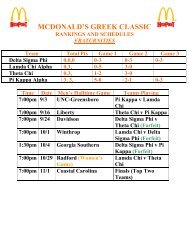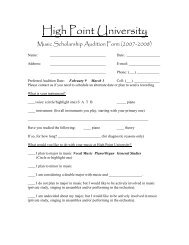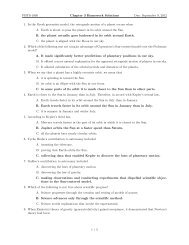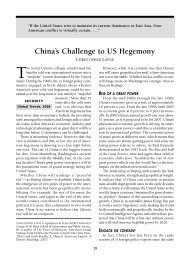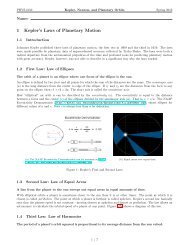Course syllabus - High Point University
Course syllabus - High Point University
Course syllabus - High Point University
Create successful ePaper yourself
Turn your PDF publications into a flip-book with our unique Google optimized e-Paper software.
INTERNATIONAL RELATIONS<br />
PSC 2710, <strong>High</strong> <strong>Point</strong> <strong>University</strong><br />
Dr. Mark Setzler<br />
Spring 2012 Syllabus<br />
Instructor: Dr. Mark Setzler<br />
Seminars: Mon., Wed., & Fri: 1:25 - 2:25<br />
Meeting Place: Congdon Hall, rm. 355<br />
Office Hours:<br />
M, W: 2:15 – 3:15<br />
T & TH: 9:15 – 10:15<br />
F: 9:00 – 10:00<br />
or by appointment<br />
Contact Information:<br />
Office: Qubein Hsll, rm. 365<br />
Work phone: 336/841-9018<br />
Home phone: 336/834-0185<br />
Email: msetzler@highpoint.edu<br />
Web: http://www.highpoint.edu/~msetzler<br />
UNIVERSITY CATALOG DESCRIPTION:<br />
This course explores how global and domestic politics interact to shape foreign policy behaviors, strategic alliances,<br />
and interactions among nations. Students will investigate why countries choose to cooperate or engage one another<br />
in conflict, how globalization and the changing fortunes of the world’s most powerful nations are reshaping the roles<br />
and power of international institutions, and the extent to which nations are likely to work together to solve the most<br />
pressing international problems of our day.<br />
AN OVERVIEW OF THE COURSE :<br />
This lower division seminar surveys the use of military, economic, and other forms of power in the post-Cold War<br />
international system. The course's main units are structured around three big questions: Why do countries act the<br />
way they do Under what circumstances and how do nations work together to address serious collective challenges<br />
What are the main opportunities and threats that will shape global politics in the 21st century In the first unit, we,<br />
we will learn, critique, and apply the main theories and concepts of the international relations discipline, tackling<br />
questions such as: Why are governments so reluctant to cooperate with other countries even within world regions<br />
where multiple societies share virtually-identical socioeconomic and cultural characteristics Why do so many<br />
countries strongly enforce one set of political, economic, and cultural values within their own societies only to<br />
eschew these same norms when dealing with other nations The second course unit explores the central institutions<br />
and processes driving contemporary international politics, asking among other questions: How powerful are<br />
international organizations and regimes Who runs these organizations and for what ends Why are the central<br />
threats to international security—international conflict, genocide, and severe economic inequality among nations—<br />
still commonplace in our unprecedentedly prosperous world In the final unit, we will investigate several of the most<br />
consequential developments for the future of international relations, including growing resource scarcity, the decline<br />
of American hegemony, the rise of China and regional power blocks, and the growing influence of international<br />
norms on domestic political behaviors.<br />
One of the main goals of this class is to stimulate student input, questions, and discussion. In most seminars, I will<br />
either present new materials or lead discussions of your assigned readings. In both cases, I typically will organize our<br />
dialog around a loosely-structured, lecture format that relies on active, informed class participation. Please make the
most of our seminar discussions and class exercises by consistently coming to class well-read and fully prepared to<br />
ask questions, to comment insightfully on the day's reading assignments, and to engage the ideas and perspectives of<br />
other students.<br />
COURSE OBJECTIVES (After completing this course, you should be able to do the following):<br />
• Demonstrate a comprehensive understanding of and an ability to apply concretely the main concepts and<br />
theories that social scientists—especially political scientists, economists, and political sociologists—use to study<br />
interactions between countries and societies.<br />
• Demonstrate a broad familiarity with the leading political, economic, and social issues driving contemporary<br />
inter-state relations in the world today.<br />
• Be able to explain, appreciate, critically analyze, and compare a variety of non-US cultural views vis-à-vis<br />
mainstream American perspectives on leading international relations issues and policy preferences.<br />
• Be able to explain and critically analyze the role of the international community and globalization in<br />
transforming domestic political, economic, and social relations across various types of societies.<br />
• Be able to identify, compare, and articulate cross-cultural variations in strategic interests, international policy<br />
priorities, and relations with the international community for a number of specific, highly-influential nation<br />
states and world regions, including: India, China, Iran, Iraq, Israel, North Korea, Pakistan, Russia, the nations of<br />
sub-Saharan Africa, Turkey, the United States, and Western Europe.<br />
• Be able to identify, analyze, and compare the most influential international organizations in the contemporary<br />
global economic and political system, including most prominently the UN, the WTO, the IMF, the World Bank,<br />
and leading international non-governmental actors.<br />
READING SOURCES AND REQUIRED MATERIALS:<br />
• A textbook: Joshua S. Goldstein, Jon C. Pevehouse. 2012. International Relations, 10 th (Full) edition.<br />
Longman Publishing.<br />
• Numerous academic journal and news magazine articles. <strong>High</strong> <strong>Point</strong>'s library subscribes electronically<br />
to almost all of your non-text reading assignments. While you are free to locate these materials by using the<br />
library’s on-line resources on your own, most students will probably want to download the readings from the<br />
links and archives I have placed on the course's website for the sake of convenience (you can access readings by<br />
following the electronic links I have embedded in the on-line version of the assignments schedule). To open and<br />
read many of the assignments downloaded from the course website, you will need to use a PDF reader of some<br />
type. You will also need a class-specific password that will be provided in class.<br />
STUDENT ASSESSMENT:<br />
• Two in-class unit examinations: 30 percent of the course grade. At the end of the first two course<br />
units, you will take in-class examinations that assess your understanding of the unit's assigned materials—<br />
including feature-length films that will be assigned for out-of-class viewing—as well as discussion from our<br />
seminar meetings. Both tests will count the same towards your final grade, and they will each include a<br />
battery of true-false questions as well as several essay items. The true-false questions will assess your<br />
familiarity with major concepts from the unit; this section will be worth one-fourth of your test grade. The<br />
more heavily weighted section of open-ended questions will assess how well students can apply evidence<br />
from seminar materials to analyze important concepts, theories, principles, and events. In preparing for<br />
exams, please carefully consult your focus questions as well as my on-line rubric detailing how the short answer<br />
questions will be graded.<br />
-2-
• Two analytical essays: 20 percent. After each of first two course units, you will write an analytical essay<br />
on a major theme covered in the course unit. You must write at least one of these papers, but are welcome to<br />
do both (in which case, the paper grades will be averaged). Papers should be no shorter than 1750 words<br />
(approximately 6-7 pages), excluding the citations and bibliography. These essays must be completed using<br />
only the assigned materials, and they will be graded using the detailed criteria that I have placed in a handout<br />
on the course website.<br />
• An op-ed article: 10 percent. On the last day of the semester, you will submit a typed essay that is no<br />
shorter than 1000 words in length (3-4 pages). Drawing upon a limited amount (a minimum of five sources)<br />
of independent research, your essay will argue that the United States government should pursue a specific<br />
course of action with respect to a major global problem that will require the coordinated response of multiple<br />
countries. You will receive more detailed instructions later in the term.<br />
• A final examination: 25 percent. Your final exam will have two components. The first part of the test is<br />
worth 15 percent of your course grade, and it will be similar in structure and grading criteria the<br />
examinations taken after the first two class units. It will focus exclusively on course materials from Unit 3.<br />
The second part of your final will be a long essay worth 10 percent of your course grade. It will address one or<br />
more of the major themes covered in the course as a whole. The essay topic will be given to you on the last<br />
day of class.<br />
• Participation and professional conduct: 15 percent. Your thoughtful, informed participation will<br />
further this course's learning objectives. Obviously, you must be in class to contribute and get the most<br />
out of class discussion. Your questions, insights, and opinions—especially those directed at the assigned<br />
readings and the course materials—are encouraged and valued. If it is apparent that many students are<br />
not adequately prepared to discuss assigned materials, I reserve the right to use graded pop quizzes as a<br />
primary measure of participation. To calculate your base participation grade, I will use a rubric that I have<br />
placed on the course’s website to assign a separate grade at mid-term and at the end of the course. If you<br />
are unsure of what is expected of you with respect to class participation, please see me after you have<br />
reviewed the participation assessment hand-out that I have placed on the course website.<br />
My approach to assessing classroom participation and professionalism aims to help you exercise the selfdiscipline<br />
required to remain intellectually engaged for significant periods of time and to take notes<br />
effectively by hand in learning settings where the discussion infrequently follows a rigid, predetermined<br />
path. Both of these skills are broadly required in professional work settings, and your mastery of them will<br />
likely to prove critical to your advancement with future employers. While the inappropriate use of<br />
electronic devices and similarly distracting behaviors are obviously unprofessional, even when laptops<br />
and phones are used exclusively to take class notes, they virtually eliminate eye contact and the other<br />
types of non-verbal communication that allow for meaningful conversations to take place. As such,<br />
multiple violations of course policies listed below concerning the use of electronic devices will result in an<br />
F being assigned for your course participation grade.<br />
FINAL GRADING SCALE:<br />
The university’s catalog requires grade assignments to accurately reflect each student’s performance. A<br />
range grades must be reserved for students whose work is “of a markedly superior quality,” which means<br />
that these grades will only be assigned to exceptional work that is of the highest quality typically found in<br />
courses at this level. Bs will reflect student work that is both “excellent” and “clearly above average.” C<br />
range grades will be assigned to work that is both “satisfactory” and consistent with the performance of<br />
an “average student” taking a course at this level. Ds will be recorded where a student's work is<br />
“unsatisfactory,” such that it is evident that the student does not understand or cannot communicate<br />
many of the course’s basic elements and materials. Fs are assigned when a student's work has not been<br />
completed or is so deficient that it does not merit college credit. Grades will be compiled throughout the<br />
term using a numerical scale:<br />
-3-
A: 92.5-100 percent<br />
A-: 90.0-92.49<br />
B+: 87.5-89.99<br />
B: 82.5-87.49<br />
B-: 80.0-82.49<br />
C+: 77.5-79.99<br />
C: 72.5-77.49<br />
C-: 70.0-72.49<br />
D: 60.0-69.99<br />
COURSE POLICIES:<br />
• Academic dishonesty. I fully support and enforce the university's Honor Code. As a condition of<br />
membership in the university community, every <strong>High</strong> <strong>Point</strong> Student is honor-bound to refrain from<br />
cheating, collusion, and plagiarism. You are also honor-bound to report violations of the honor code<br />
should you ever observe them. Without exception, students taking or facilitating an inappropriate<br />
academic advantage will be have an honor code violation noted in their permanent <strong>University</strong> file<br />
and be sanctioned according the applicable college policy. Acts of academic dishonesty include the<br />
presentation of another student's or author's ideas as one's own work, misconstruing the<br />
circumstances under which classes and deadlines have been missed, purposefully misreporting<br />
paper counts, and inaccurately representing that assignments have been completed.<br />
• You may not use phones, laptops, or other electronic devices. Unless you are granted an<br />
explicit exemption by your instructor (requests will be evaluated on a case by case basis and<br />
permission make revoked at any time at your instructor's discretion), you may not take notes with or<br />
otherwise use any electronic device other than a voice recorder during our seminar meetings. The<br />
penalties for violating this policy are described in the section above on the assessment of<br />
participation.<br />
• Instructor availability outside of the classroom. Please know that I want students to learn as<br />
much as they can from this class and to receive good grades. You are strongly encouraged to make<br />
an individual appointment with me should you have undue difficulty successfully completing your<br />
work. Please feel free to call me at home (834-0185) if an issue is urgent, and I am not available at<br />
the office. I am willing to schedule meetings outside of my posted office hours for reasons of privacy<br />
or when your schedule requires it. I have young children, so please do not call me at home after 8:00<br />
p.m. or before 8:00 a.m. If you need to leave a message for me outside of class or scheduled office<br />
hours, you may also contact me via electronic mail. I usually check to see if I have new messages a<br />
few times each day. Meeting with students during office hours is one of the most important and<br />
enjoyable aspects of my job. If you have any questions, concerns, or suggestions, my door is almost<br />
always open for several hours each day and special appointments will be made as necessary.<br />
• Papers and assignments must be submitted in both hard copy and by e-mail<br />
attachment. For purposes of record keeping, you required to submit a copy of all typed<br />
assignments by e-mail. Copies of work should be sent to me by the time they are due by e-mail<br />
attachment from your HPU e-mail account and in a format that can be opened by MS Word. If you<br />
need help meeting these requirements, please see me for assistance during the first week of the<br />
semester.<br />
• Make-up tests and quizzes. You are required to take all exams and quizzes on the days they are<br />
given, and make-up work for unscheduled absences will not be allowed except in the case of serious<br />
extenuating circumstances that can be verified (e.g., a serious illness). As likely will be the case with<br />
your future employers, I am much more flexible about rescheduling work and giving extensions<br />
when you provide advance notice and a reasonable justification for needing to move an assignment's<br />
due date. If you know you will not be able to make a paper deadline or take a test on the scheduled<br />
day for a compelling reason (e.g. participation in university-sponsored event), you need to make<br />
arrangements with me, in person, well before the day the test is given. Please note that when a<br />
make-up test is granted, I reserve the right to alter the structure of that exam from what was given to
the rest of the class. For reasons of exam security and out of fairness to all students, I do<br />
not give early examinations (including the final), so you need to make your travel<br />
plans accordingly.<br />
• Class attendance policy. Your punctual attendance at every class meeting is expected. Any<br />
student who misses more than four classes during the term may be withdrawn from the course at my<br />
discretion. Should you miss three classes, paperwork will be filed with the college, requiring you to<br />
attend a meeting with our Academic Services staff to discuss the educational impact of your<br />
absenteeism. If you are unable to attend class for any reason, you are responsible for obtaining all<br />
missed materials. Please be aware that punctual, regular attendance makes up an integral part of<br />
your class participation grade.<br />
• E-Mail accounts. All students are required to have an active HPU email account that they<br />
regularly check. Like most faculty and staff at the university, I assume that any message sent to your<br />
university mailbox will be accessed by you within a couple of days; be advised that I may use your<br />
HPU account to distribute important course materials or announcements. If you have any questions<br />
about appropriate etiquette when professionally communicating with me through e-mail, please<br />
consult my on-line handout addressing e-mail usage.<br />
• Disability accommodations. Students who require classroom accommodations due to a<br />
diagnosed disability must submit the appropriate documentation to Disability Support in the Office<br />
of Academic Development, 4th Floor Smith Library. Requests for accommodations should be made<br />
at the beginning of a course. Accommodations are not retroactive. Contact Rita Sullivant,<br />
Coordinator of Disability Support, rsulliva@highpoint.edu, 336-841-9061 for additional<br />
information.<br />
-5-
COURSE TOPIC SCHEDULE AND MAJOR ASSIGNMENT DEADLINES<br />
The typical reading load in this class is 75-100 pages each week, which should be completed<br />
before the applicable seminar. Please consult the on-line version of this document for more<br />
detail and links to your readings and assignments. Many of the readings will be<br />
downloaded and require a password to be opened: icecream<br />
UNIT I: UNDERSTANDING STATE BEHAVIOR<br />
January 9 (M)—Introduction to the course<br />
January 11 (W)—What is the study of “International Relations” about<br />
January 13 (F)—Getting started with some basic concepts<br />
January 16 (M)—Martin Luther King Day, no class<br />
January 18 (M)—What are the defining qualities of “the modern state system”<br />
January 20 (F)—How has the international system of global power evolved in the in the 20th C<br />
January 23 (M)—Leaders, the sociopolitical structures, or the international system: How do “levels” of<br />
analysis help us to predicts what countries do<br />
January 25 (W): How can the theories of “realism” and “liberalism” help us to predict state actions<br />
January 27 (F)—Is international politics what we (or at least what those of us of who are well off) choose to<br />
make it “Marxist” and “constructivist” theories of state behavior<br />
January 30 (M)—Is globalization a new international system with different rules of state behavior<br />
February 1 (W)—How is globalization transforming states and societies in the developing world<br />
February 3 (F)—Examination 1<br />
UNIT II: INTERNATIONAL REGIMES, BEHAVIOR, & INSTITUTIONS<br />
February 6 (M)—Who needs international organizations What are the alternatives<br />
February 8 (W)—Why and how contemporary war is waged<br />
February 10 (F)—Is there an international solution to national insecurity<br />
February 13 (M)—Paper 1 is due electronically and in hard copy by the start of class<br />
February 13 (M) & 15 (W)—How does the United Nations work and what does it do<br />
February 17 (F)—Can we make the United Nations work better to reduce international conflict<br />
February 20 (M)—Is there an international solution to the proliferation of weapons of mass destruction<br />
February 22 (W)—How and to what extent do international regimes regulate the global economy<br />
February 24 (F)—How do (and should) international institutions respond to economic crises )<br />
February 27 (M)—Why do countries trade, and how do global institutions shape economic exchange<br />
February 29 (W)—To what extent is global development really an “international” issue<br />
March 2 (F)—Why are some poor countries benefiting from globalization while others are not<br />
March 5, 7, & 9—No class: Spring break<br />
March 12 (M)—Are there international solutions to problems of development and underdevelopment<br />
-6-
March 14 (W)—Have we finally moved beyond anarchy and sovereignty International law and human<br />
rights<br />
March 16 (F)— Examination 2<br />
UNIT III: ISSUES AND CHALLENGES IN INTERNATIONAL RELATIONS<br />
March 19 (M)—Should the world fear or embrace American hegemony<br />
March 21 (W) Is American empire in trouble<br />
March 23 (F)—What happens when America no longer leads<br />
March 26 (M)— Paper 2 is due electronically and in hard copy by the start of class<br />
March 26 (M)—The Chinese economic miracle and global politics<br />
March 28 (W)—Imperial ambitions China's foreign relations<br />
March 31 (F)—The US-Chinese relationship: The next Cold War<br />
April 2 (M)—What does the emergence of the EU mean for global politics<br />
April 4 (W)— Is the EU sustainable Can the model travel<br />
April 6, 9— No class: Easter break<br />
April 11 (W)—Does globalization have a dark side<br />
April 13 (F)—How can a system of states deal with global criminal and terrorist networks<br />
April 16 (M)—The op-ed assignment is due electronically and in hard copy by the start of<br />
class<br />
April 16 (M)—Clashes of civilizations Culture, nationalism, and international relations<br />
April 18 (W)—Is Islamic nationalism a global threat<br />
April 20 (F)—Is civilizational conflict inevitable or constructed<br />
April 23 (M)—<strong>Course</strong> wrap-up: What did you learn in this class<br />
During this week, please make sure to complete the <strong>University</strong>'s on-line course<br />
evaluation for this class. The evaluations system is open the last week of classes but ends before<br />
exams start.<br />
Final examination. Your third exam will be taken during the university-scheduled exam period<br />
for this class, which is: Friday, April 27: 1:30 – 4:30 pm. When making plans to leave for summer<br />
break, you must make travel arrangements to reflect your need to be on campus for our final.<br />
-7-


